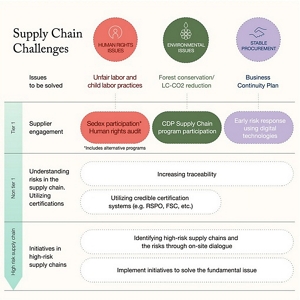ESG Promotion Activities with Suppliers
Based on our Policies for Procurement, we establish the ESG Promotion Activities with suppliers and are committed to securing the traceability of the entire supply chain while working together with our suppliers. We will work to source our raw materials in ways that protect natural resources, the environment, safety and human rights.
1. Building sustainable supply chains
We are conducting the following initiatives.
- We will increase traceability for raw materials procurement and confirm the supply chain back to the raw materials while working together with our suppliers.
-
We will identify risks related to human rights and the environment in our supply chains and implement activities to improve them while working together with our suppliers.
- Promotion of human rights and environmental due diligence through participation in and response to Sedex*1 (including alternative programs, such as Kao SAQ*2 ) and the CDP Supply Chain Program*3 .
- Initiatives for identifying risks using third-party audits (SMETA*4 and others) and making improvements (releasing audit numbers).
- We promote the procurement of raw materials using third-party certification systems (RSPO, FSC, etc.) while working together with our suppliers.
- We make efforts to reduce CO2 emissions relating to procurement for all raw materials while working together with our suppliers.
- We will develop a system using digital technologies to effectively share information with our suppliers to build capacity for early response to issues as they arise while working together with our suppliers.
We define suppliers involved in the procurement of natural resources (palm oil, paper and pulp, etc.) and those that conduct inadequate due diligence in terms of human rights and the environment as “high-risk suppliers”. We identify “high-risk suppliers” and periodically review them with the approval of the Executive Officer in charge of purchasing.
We prioritize conducting third-party audits of “high-risk suppliers”, and conduct initiatives to identify risks and make improvements.
-
*1Sedex (Supplier Ethical Data Exchange)
A large-scale, global platform for the sharing and verification of information relating to labor standards, health and safety, environmental protection and business practices, aimed at promoting the adoption and maintenance of ethical business practices in global supply chains. -
*2Kao SAQ, alternative programs
Kao SAQ: Kao’s proprietary survey form that complements Sedex Alternative programs: Alternative research programs to Sedex such as EcoVadis -
*3CDP Supply Chain Program
CDP is a nonprofit organization (with its headquarters in London) that is operated by institutional investors that requests business enterprises to disclose information relating to climate change, water security and forests. The CDP Supply Chain Program is an initiative in which participating enterprises ask the firms that make up their supply chain to disclose information relating to climate change, water security and forest activities via the CDP platform. -
*4SMETA (Sedex Members Ethical Trade Audit) An audit format that covers the four pillars of Sedex: labor, health and safety, environment and corporate ethics.
2. Initiatives for “high-risk supply chains”
We identify “high-risk supply chains” in our raw materials procurement from comprehensive consideration of the following three perspectives.
- Business perspective: Procurement amount and the possibility of replacement with alternative raw materials, etc.
- Geographical perspective: The risks associated with the location of the supply chain up to the base raw material
- ESG perspective: Results of supplier due diligence, etc.
At present, we identify supply chains related to palm oil and paper and pulp as “high-risk supply chains”, have established our “High-Risk” Supply Chain Management and Sourcing, and are conducting initiatives to resolve the fundamental issues.
Going forward, we will expand this scope as necessary in consideration of the above three perspectives.
We identify “high-risk supply chains” and periodically review them with the approval of the Executive Officer in charge of purchasing.
We identify risks through on-site dialogue with “high-risk supply chains”, conduct activities (training programs) with suppliers, NGOs, NPOs and others to resolve the fundamental issues, and track and report on the progress.

-
*Tier 1: Our direct suppliers of raw materials
-
*Non-Tier 1: All supply chains involved in our procurement of raw materials, excluding direct suppliers
3. Strengthening cooperation with suppliers
We are strengthening cooperation with suppliers through the following initiatives.
Supplier assessments
We evaluate supplier activities and provide feedback to suppliers from the perspectives of ESG, stable supply and strategic partnerships, and give recognition to suppliers who receive high evaluations.
Supplier satisfaction surveys
Through supplier satisfaction surveys, suppliers evaluate the fairness of our procurement activities.
Over 30 items are surveyed, including vendor selection, quality, ordering, customer service and communication. We accept the survey results in good faith, and use them to make improvements to daily procurement activities.
Vendor summits
Each year, we hold vendor summits to provide a place to share information and exchange opinions with suppliers, and communicate our business performance and procurement policy as well as information on selected themes for the year.
Dialogue at supplier sites
We conduct routine visits to supplier sites, and strive to deepen our understanding of issues in the supply chain and at production sites through direct dialogue at production sites.
April 17, 2025
Masakazu Negoro
Representative Director, Senior Managing Executive Officer
Kao Corporation
- Home
- Sustainability
- Making Thoughtful Choices for Society
- Responsibly Sourced Raw Materials
- ESG Promotion Activities with Suppliers
- Home
- Sustainability
- Making Thoughtful Choices for Society
- Responsibly Sourced Raw Materials
- ESG Promotion Activities with Suppliers
